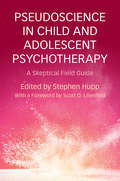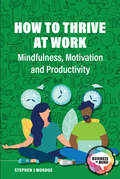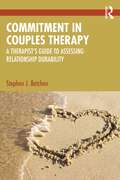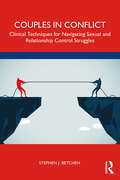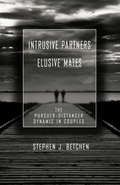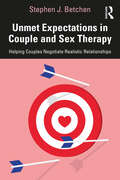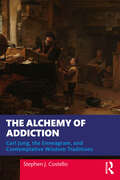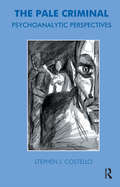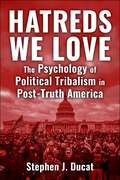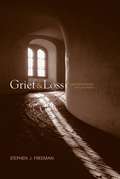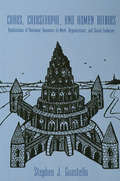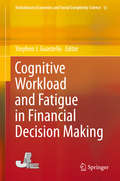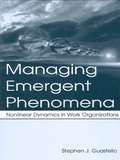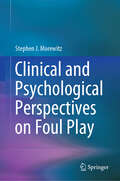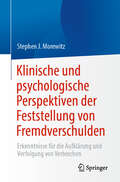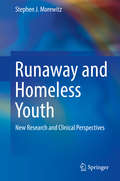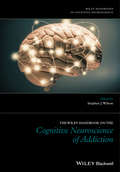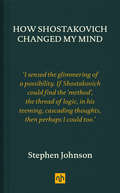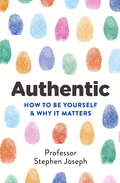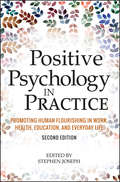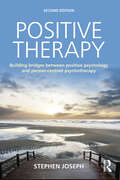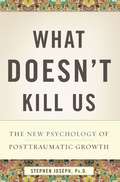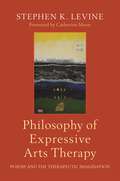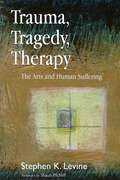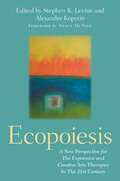- Table View
- List View
Pseudoscience in Child and Adolescent Psychotherapy: A Skeptical Field Guide
by Stephen HuppMost infants, children, and adolescents facing mental health challenges - including autism, psychosis, mania, depression, anxiety, and substance use - do not receive evidence-based treatments. Instead, they commonly receive ineffective and even harmful treatments. In this book, leading experts from the fields of clinical psychology, school psychology, developmental psychology, pediatric neurology, applied behavior analysis, and social work identify the most problematic psychotherapy interventions used for each mental health issue. In addition to these primary authors, each chapter includes a side bar from a specialist representing the disciplines of pediatrics, anthropology, neuroscience, and psychology. The contributors work in academia, hospitals, and private practice and include book authors, podcasters, and even a filmmaker. Not only does this book highlight the threats of potentially harmful pseudoscience, it also summarizes treatments that actually have a strong evidence base and deliver far more positive results.
How to Thrive at Work: Mindfulness, Motivation and Productivity (Business in Mind)
by Stephen J MordueAn essential read for anyone experiencing low level anxiety or stress, this book pulls together the various individual strands of business logic, scientific research, self-care, spirituality and common sense to provide a one-stop guide to thriving at work.The widespread ‘more for less’ attitude is creating a dramatic rise in work-related stress and a higher ratio of staff sickness. Not only does this create a fiscal impact upon the organisation and the broader economy but it has the potential to create significant long-term mental health issues for employees.You cannot always alter the demands of your professional or personal lives but, by understanding more about how your brain functions and by actively pursuing well-being techniques, you can enhance the skills that help you manage and succeed at the challenges thrown at you and reduce the risks associated with burnout.With a focus on improving mindfulness, motivation and productivity, this book offers sound, practical advice and strategies for self-care whatever your working environment and whatever stage you are at in your career.
Commitment in Couples Therapy: A Therapist’s Guide to Assessing Relationship Durability
by Stephen J. BetchenCommitment in Couples Therapy offers a comprehensive clinical guide to help those who work with couples determine the authenticity of a couple’s commitment, and to guide their decision on whether the relationship is worth salvaging.The purpose of this book is to focus on those couples who have joined for reasons that pose a significant chance of relational failure. This specific dyad entails one seemingly “committed” partner and one apparently “less committed” partner, both of whom may be conscious or unconscious about their sabotaging behavior in the relationship. Betchen offers a clinical model to treat the commitment issue and help the couple’s therapist skillfully uncover each partner’s conflict with commitment, determine the couple’s true relational status, and determine how to re-contract the relationship on more authentic grounds. Chapters provide coverage of the unconscious match process, the sociocultural, transactional, familial, and psychological factors behind commitment, and countertransference, with case studies throughout. Finally, this book offers critical assessment and treatment strategies for therapists to implement in their practice.This book is an essential read for mental health clinicians of all levels, and a valuable resource for graduate students in marriage and family therapy programs.
Couples in Conflict: Clinical Techniques for Navigating Sexual and Relationship Control Struggles
by Stephen J. BetchenIn the first book of its kind, Dr. Stephen J. Betchen teaches established and training marriage and family therapists to recognize the complexity and contradictions of control struggles in couples and, uniquely, how to clinically treat these issues to create a harmonious, long relationship. Integrating conflict theory, psychodynamic systems work, and the basic principles of sex therapy, the book aims to help professionals recognize and assess control struggles in couples, detect and examine their origin, and offer techniques to help break the struggle and alleviate its associated symptoms. Chapters begin by defining control and where the origin of control comes from before exploring how these origins and other sociocultural factors impact how we choose our partners. The book’s second half examines how clinicians should assess and treat couples with both sexual and nonsexual symptoms, how to avoid being caught in the control crossfire as a therapist, and how to terminate sessions and prevent relapses. Filled with case studies and useful interventions throughout, this book aims to help clinicians working with all couples across cultures and sexual orientations find a common ground. It is indispensable for training and graduate clinicians that work with couples, especially couples with sexual disorders.
Intrusive Partners - Elusive Mates: The Pursuer-Distancer Dynamic in Couples
by Stephen J. BetchenWhen two people form a relationship or marry, they begin to move towards one another with the expectation of closeness. The emotionality or intensity that accompanies this process, however, may result in fusion followed by a desperate need for space or distance. Intrusive Partners - Elusive Mates is the first book to deal exclusively with the pursuer-distancer interaction, and to focus significant attention on the emerging male pursuer-female distancer dynamic. This book revisits Fogarty's work, traces the concept over time and across different professional fields, and discusses in detail the concepts correlation with gender issues and social change. A detailed, step-by-step model of treatment to aid in de-escalating this potentially problematic style is also offered. The model in and of itself is unique because it integrates psychoanalytic conflict theory and psychodynamic systems theory into one treatment approach. This book is intended to offer the therapist a model for understanding and effectively discussing this dynamic, while at the same time allowing couples to read and explore it on their own.
Unmet Expectations in Couple and Sex Therapy: Helping Couples Negotiate Realistic Relationships
by Stephen J. BetchenStephen J. Betchen illuminates unmet expectations as one of the leading causes of relationship problems, offering an integrative, systemic, and conflict-oriented treatment model that will help both therapists and couples develop happier and more realistic relationships. This clinical guide helps therapists provide couples with the ability to recognize the origin of their expectations and when their expectations might be realistically or unrealistically too high or low. It defines and demonstrates the complexity of what met or unmet expectations are, identifying common symptoms as anger, incessant bickering, anxiety, disappointment, disillusionment, and sadness. Chapters outline how to determine the origin and impact of unmet expectations before discussing how and why we choose our partners that do or do not meet our needs. Addressing sociocultural factors in depth, Betchen provides tools to assess and treat both sexual and non-sexual symptoms and includes a chapter on how to manage the issue of when a therapist doesn’t meet the expectations of their clients. The book is invaluable for therapists who work with couples as well as trainees and supervisors in couple, family, and sex therapy graduate and post-graduate programs.
The Alchemy of Addiction: Carl Jung, the Enneagram, and Contemplative Wisdom Traditions
by Stephen J. CostelloWithin this important book, Stephen J. Costello draws on Eastern philosophy, Western psychology, and wisdom traditions to offer an interpretation and answer to the multidimensional problem of addiction.The nature of pleasure, pain, and attachment are discussed, together with stress as a key source of our suffering. Justifying and grounding the work is C. G. Jung’s central insight that the solution to our disordered desires lies in cultivating a spiritual approach to life. As such, a detailed exploration of the Twelve Steps of recovery is elucidated from the threefold perspective of the philosophy of Advaita, the Enneagram system, and the Christian contemplations of Richard Rohr, John Main, and Thomas Keating, as well as St Ignatius of Loyola. The work concludes with a brief look at Platonic ethics, especially the virtue of temperance, St Benedict’s spirituality of humility, and the law of dharma as a blueprint for purposeful non-addicted living.This book will appeal to a wide variety of readers such as mental health professionals in the counselling and psychotherapy professions, as well as students of depth psychology and philosophy.
The Pale Criminal: Psychoanalytic Perspectives
by Stephen J. CostelloIt was Freud, borrowing Nietszche's phrase from Thus Spake Zarathustra, who described as 'pale criminals' those who committed criminal acts out of deep-lying (unconscious) guilt. The focus of this challenging and penetrating study is on this type of criminality. The book bring sa 'unifying vision and theoretical integration' to the array of perspectives and theories in this field. He draws together for the first time the thoughts on the subject of Sigmund Freud, Carl Jung, Melanie Klein, Donald Winnicott and Jacques Lacan, examines the contributions of both orthodox and evolutionary psychiatry, and explores the role of family experience in shaping the 'pale criminal'. The result is an ambitious theory of criminality; a depth-psychological psychoanalytic model of the human being.In the early chapters, the aurthor provides a judicious and even-handed exposition of his chosen thinkers' views, before proceeding to an impressive and well-argued dialectical synthesis in which each theoretical perspective is used to correct, qualify or supplement the others. In a diffuse and divided field, this volume should provide an indispensable source of clarification and a stimulus to open creative debate.
Hatreds We Love: The Psychology of Political Tribalism in Post-Truth America
by Stephen J. DucatAn in-depth psychological, anthropological, neuroscientific, and historical look at MAGA Republicans and the American Far Right. Fueled by conspiracy thinking and a growing indifference to facts, some Americans, especially on the Right, are increasingly seeing their fellow citizens as threats that must be eliminated. We are witnessing an epidemic of domestic terrorism with a rapidly accumulating body count. This may be the most serious challenge to the integrity of the United States since the Confederate insurrectionists launched their assault on Fort Sumpter in 1861. While an in-depth psychological reading of political events, Hatreds We Love: The Psychology of Political Tribalism in Post-Truth America is grounded in the scholarship and insights of social psychologists, anthropologists, historians, psychoanalysts, neuroscientists, and the many intrepid journalists increasingly threatened by authoritarians who have good reasons to fear truthful reporting. And, of course, author Stephen J. Ducat draws on his own experiences, visions, and values. A major topic addressed in the book is the malignant mindset animating MAGA neo-fascism's zealous partisans. Donald Trump&’s fortunes may fade in the coming months and years, but Trumpism will likely remain ascendant. Of course, xenophobic bigotry, violent aversion to democracy, political cults of personality, and indifference to facts are global phenomena and not limited to the United States. But America plays a prominent role, even abroad. In December 2022, it was revealed that a right-wing coup attempt in Germany was, to some extent, modeled on America&’s own post-election insurrection, which was planned and executed by the paramilitary wing of the MAGA movement. That German episode was not the first time that the actions of American anti-democratic and white supremacist groups became the template for similar efforts worldwide. In the 1930s, German fascists looked to America as a blueprint for implementing race-based tribalism. Hitler so admired Jim Crow laws in the United States, especially concerning citizenship and anti-miscegenation laws, that he sent a team of legal scholars to study their statutory framework for addressing the problem of "racial pollution." While the Nazis initially found a lot to love and incorporate into the Nuremberg Laws, they ironically rejected much of the American model as too harsh. Many pundits have decried the &“extremism&” of Trumpian lynch-mob politics. On the contrary, Hatreds We Love argues that it is contiguous with the long history of American conservatism going back at least to the antebellum South. From this perspective, the worldview and actions of the GOP's MAGA faction are the logical outcomes of the consistently expressed right-wing ethos of domination, xenophobia, and the "freedom" to harm. Although there is much handwringing about the toxic synergy of authoritarian political forces, white identity politics, and the embrace of post-factuality, there is insufficient understanding of the links between them. Chief among those links is tribal psychology. Nearly every political pundit decries political tribalism. Yet, public discussion rarely addresses more than its most disturbing symptoms. Hatreds We Love speaks to the causes and underlying dynamics of what is now one of the greatest threats to the viability of what remains of American democracy and global democratic governance more broadly.
Grief and Loss: Understanding the Journey
by Stephen J. FreemanThis text provides pertinent theoretical and practical information, enhancing the reader's understanding of the process and the dynamics of grief and loss. Freeman views the helping professional's personal feelings, fears, and expectations as significant factors affecting facilitation of the grieving process that must be examined.
Chaos, Catastrophe, and Human Affairs: Applications of Nonlinear Dynamics To Work, Organizations, and Social Evolution
by Stephen J. GuastelloWhether talking about steering a wheelbarrow over rugged terrain or plotting the course of international relations, human performance systems involve change. Sometimes changes are subtle or evolutionary, sometimes they are catastrophic or revolutionary, and sometimes the changes are from periods of relative calm to periods of vibrant oscillations to periods of chaos. As a general rule, more complex systems are likely to produce more complex forms of change. Although social scientists have long acknowledged that change occurs and have considered ways to effect desirable change, the dynamical processes of change have been poorly understood in the past. This volume combines recent advances in mathematics and experimental design with the best available social science theories to produce a new, integrated, and compact theory of work, organizations, and social evolution. The domains of application extend from human decision-making processes to personnel selection and work motivation, work performance under conditions of stress, accident and health risk analysis, the development of social institutions and economic systems, creativity and innovation, organizational development and group dynamics, and political revolutions and war. Relative to other literature on nonlinear dynamical systems theory (NDS), this book is unique in that it integrates new developments in NDS with substantive psychological theory. It builds on many recent developments in organizational theory to show that nonlinear dynamics were often implicit in those works all along. The result is an entirely new way of viewing social events, understanding change processes, and asking questions about social systems. This book also contains much new empirical work and explains the newly developed methods for testing these new hypotheses.
Cognitive Workload and Fatigue in Financial Decision Making (Evolutionary Economics and Social Complexity Science #13)
by Stephen J. GuastelloThis book presents new theory and empirical studies on the roles of cognitive workload and fatigue on repeated financial decisions. The mathematical models that are developed here utilize two cusp catastrophe functions for discontinuous changes in performance and integrate objective measures of workload, subjective experiences, and individual differences among the decision makers. Additional nonlinear dynamical processes are examined with regard to persistence and antipersistence in decisions, entropy, further explanations of overall performance, and the identification of risk-optimization profiles for long sequences of decisions.
Managing Emergent Phenomena: Nonlinear Dynamics in Work Organizations
by Stephen J. GuastelloChaos, catastrophe, self-organization, and complexity theories (nonlinear dynamics) now have practical and measurable roles in the functioning of work organizations. Managing Emergent Phenomena begins by describing how the concept of an organization has changed from a bureaucracy, to a humanistic and organic system, to a complex adaptive system. The dynamics concepts are then explained along with the most recent research methods for analyzing real data. Applications include: work motivation, personnel selection and turnover, creative thinking by individuals and groups, the development of social networks, coordination in work groups, the emergence of leaders, work performance in organizational hierarchies, economic problems that are relevant to organizations, techniques for predicting the future, and emergency management. Each application begins with a tight summary of standard thinking on a subject, followed by the new insights that are afforded by nonlinear dynamics and the empirical data supporting those ideas. Unusual concepts are also encountered, such as the organizational unconscious, collective intelligence, and the revolt of the slaved variables. The net results are a new perspective on what is really important in organizational life, original insights on familiar experiences, and some clear signposts for the next generation of nonlinear social scientists.
Clinical and Psychological Perspectives on Foul Play
by Stephen J. MorewitzClinical and Psychological Perspectives on Foul Play examines a wide range of factors that can influence how police determine foul play in possible homicide cases and in other possible crimes. It develops a new theory of uncertainty at micro, meso, and macro levels to explain how law professionals arrive at this decision. Specifically, it examines the extent to which uncertainty in these situations can be influenced by media coverage, family and community pressures, socioeconomic factors, demographic elements of victims, as well as police knowledge and resources. Written for forensic practitioners, this book describes how these professionals can consult with law enforcement on such issues as the staging of crime scenes to mask intent, the initiation of community strategies to find missing persons, and the reliability of behavioral profiles. The latest research from the Foul Play Project and the Missing Persons Project are employed to support the recommendations in this book and to point the way toward further research in this area.
Klinische und psychologische Perspektiven des Foulspiels
by Stephen J. MorewitzDieses Buch untersucht ein breites Spektrum von Faktoren, die Einfluss darauf haben können, wie die Polizei das Fremdverschulden in möglichen Mordfällen und bei anderen möglichen Verbrechen feststellt. Es wird eine neue Theorie der Unsicherheit auf der Mikro-, Meso- und Makroebene entwickelt, um zu erklären, wie Juristen zu dieser Entscheidung gelangen. Insbesondere wird untersucht, inwieweit die Unsicherheit in diesen Situationen durch die Medienberichterstattung, den Druck der Familie und der Gemeinschaft, sozioökonomische Faktoren, demografische Elemente der Opfer sowie das Wissen und die Ressourcen der Polizei beeinflusst werden kann. Dieses Buch beschreibt, wie forensische Fachleute die Strafverfolgungsbehörden in Fragen wie der Inszenierung von Tatorten zur Verschleierung des Vorsatzes, der Einleitung von Gemeinschaftsstrategien zur Suche nach vermissten Personen und der Zuverlässigkeit von Verhaltensprofilen beraten können. Die neuesten Forschungsergebnisse aus dem Foul Play Project und dem Missing Persons Project werden herangezogen, um die Empfehlungen in diesem Buch zu untermauern und den Weg für weitere Forschungen in diesem Bereich zu weisen.
Runaway and Homeless Youth
by Stephen J. MorewitzThis straightforward reference surveys the knowledge base on homeless, runaway, and thrown-away children and adolescents and makes concrete recommendations for policy and practice. It is a comprehensive volume, that covers new state legislation in the U. S. dealing with runaway and homeless youth. The book's ecological approach grounds readers in the demographics of this diverse population, family and other risk factors for leaving home (and alternative arrangements such as foster care), and the survival skills homeless young people use to sustain themselves. Chapters cover a gamut of physical, psychological, and social problems, from drug abuse to depression to STIs, with special attention paid to the multiple difficulties faced by LGBT street youth and street youths' experiences with the legal and justice systems. The author also assesses established and emerging interventions used with runaway youth, and the effectiveness of policy initiatives dealing with improving conditions for youth on the streets and at risk. Included in the coverage: · Runaway youth at the time of their disappearance. · Food insecurity and related problems among homeless and runaway youth. · Substance use among homeless and runaway adolescents. · Runaway and homeless sexual minorities. · Court responses to runaway offenses and other juvenile status violations. · Street youth in different countries. Presenting the complex situation as it stands, and with clear suggestions for action, Runaway and Homeless Youth is a valuable resource for family therapists, sociologists, social workers, school administrators, health professionals, police, judges, and other criminal justice professional, along with professionals involved in young people's well-being and policy-making initiatives.
The Wiley Handbook on the Cognitive Neuroscience of Addiction
by Stephen J. WilsonThis volume provides a thorough and up-to-date synthesis of the expansive and highly influential literature from the last 30 years by bringing together contributions from leading authorities in the field, with emphasis placed on the most commonly investigated drugs of abuse. Emphasises the most commonly investigated drugs of abuse, including alcohol, cocaine, nicotine, and opiates Brings together the work of the leading authorities in all major areas of the field Provides novel coverage of cutting-edge methods for using cognitive neuroscience to advance the treatment of addiction, including real-time neurofeedback and brain stimulation methods Includes new material on emerging themes and future directions in the use of cognitive neuroscience to advance addiction science
How Shostakovich Changed My Mind
by Stephen JohnsonA powerful look at the extraordinary healing effect of music on sufferers of mental illness, including author Stephen Johnson's struggle with bipolar disorder.BBC music broadcaster Stephen Johnson explores the power of Shostakovich’s music during Stalin’s reign of terror, and writes of the extraordinary healing effect of music on sufferers of mental illness. Johnson looks at neurological, psychotherapeutic and philosophical findings, and reflects on his own experience, where he believes Shostakovich’s music helped him survive the trials and assaults of bipolar disorder.There is no escapism, no false consolation in Shostakovich’s greatest music: this is some of the darkest, saddest, at times bitterest music ever composed. So why do so many feel grateful to Shostakovich for having created it—not just Russians, but westerners like Stephen Johnson, brought up in a very different, far safer kind of society? The book includes interviews with the members of the orchestra who performed Shostakovich’s Leningrad Symphony during the siege of that city.
Authentic: How to be yourself and why it matters
by Stephen JosephThe hunger for authenticity guides us throughout our lives. People strive for joined-up living, where on the one hand what they say and do reflects what they think and feel, and on the other what they think and feel reflects who they are.Stephen Joseph has pioneered developments in research into authenticity, drawing on the solid science of positive psychology to develop what has become one of the gold-standard tests for assessing authenticity. His and others' findings reveal that when people are in relationships in which they feel accepted, understood and valued, they drop their defences. They naturally begin to examine themselves psychologically, accommodate new information and live more authentically. What's more, the latest studies reveal that it is authenticity that leads to true happiness.In Authentic, Stephen Joseph presents his fresh and inspiring perspective on the psychology of authenticity alongside practical advice and exercises for the reader. Drawing on the wisdom of existential philosophers, the insights and research of psychologists, and case studies from his own and others' clinical experiences, he shows how authenticity is the foundation of human flourishing - as well as how the ideas relate to debates about the importance of happiness.
Positive Psychology in Practice
by Stephen JosephThe best minds in positive psychology survey the state of the field Positive Psychology in Practice, Second Edition moves beyond the theoretical to show how positive psychology is being used in real-world settings, and the new directions emerging in the field. An international team of contributors representing the best and brightest in the discipline review the latest research, discuss how the findings are being used in practice, explore new ideas for application, and discuss focus points for future research. This updated edition contains new chapters that explore the intersection between positive psychology and humanistic psychology, salugenesis, hedonism, and eudaimonism, and more, with deep discussion of how the field is integrating with the new areas of self-help, life coaching, social work, rehabilitation psychology, and recovery-oriented service systems. This book explores the challenges and opportunities in the field, providing readers with the latest research and consensus on practical application. Get up to date on the latest research and practice findings Integrate positive psychology into assessments, life coaching, and other therapies Learn how positive psychology is being used in schools Explore possible directions for new research to push the field forward Positive psychology is being used in areas as diverse as clinical, counseling, forensic, health, educational, and industrial/organizational settings, in a wide variety of interventions and applications. Psychologists and other mental health professionals who want to promote human flourishing and well-being will find the second edition of Positive Psychology in Practice to be an informative, comprehensive guide.
Positive Therapy: Building bridges between positive psychology and person-centred psychotherapy
by Stephen JosephThe applications of positive psychology are different from traditional interventions in therapy in that they are focused on building strength, resilience and well-being rather than being restricted to simply treating disorder. Since the publication of the first edition of Positive Therapy, there is now a comprehensive body of applied positive psychology research to which practitioners may turn in order to inform their own practice, and that sees its purpose as the facilitation of human flourishing and optimal functioning. However, much of this research and its implications are only now becoming more widely understood in counselling and psychotherapy. This new and expanded edition of Positive Therapy shows how the latest thinking in positive psychology can be applied to psychotherapeutic practice, and specifically to person-centred therapy. Making the links between positive psychology and psychotherapy explicit, Stephen Joseph describes the new tools that practitioners can draw upon to help and facilitate positive functioning in their clients. New material includes: An update of the latest positive psychology research A new preface, explaining how positive psychology principles can now be applied to therapeutic practice Focus on positive psychology measurement tools Positive Therapy will be essential reading for all psychotherapists, counsellors, social workers, coaches, psychologists and trainees interested in exploring how they engage with clients, and the implications of this engagement in practice.
What Doesn't Kill Us: The New Psychology of Posttraumatic Growth
by Stephen JosephFor the past twenty years, pioneering psychologist Stephen Joseph has worked with survivors of trauma. His studies have yielded a startling discovery: that a wide range of traumatic events-from illness, divorce, separation, assault, and bereavement to accidents, natural disasters, and terrorism-can act as catalysts for positive change. Boldly challenging the conventional wisdom about trauma and its aftermath, Joseph demonstrates that rather than ruining one’s life, a traumatic event can actually improve it. Drawing on the wisdom of ancient philosophers, the insights of evolutionary biologists, and the optimism of positive psychologists,What Doesn’t Kill Usreveals how all of us can navigate change and adversity- traumatic or otherwise-to find new meaning, purpose, and direction in life.
Philosophy of Expressive Arts Therapy: Poiesis and the Therapeutic Imagination
by Stephen K. LevineLaying the philosophical foundations of expressive arts therapy, this book highlights the role and importance of poiesis, the art of 'making' as a response to the world, in the expressive arts therapies as well as our own lives. The concept of poiesis was originally developed and brought into the field by Stephen K. Levine. It is a perspective that restores the primacy of the arts for the arts therapies instead of reducing art-making and art-objects to psychological data. Bringing together different schools of thought in unexpected ways, this book shows how the principles underlying expressive arts therapy have relevance to ethics, politics and social change. It includes chapters on Taoism, improvisation in the arts, and the importance of creativity for understanding human existence. With personal narratives and poetry to help create natural points for the reader to stop and reflect, Philosophy of Expressive Arts Therapy is the perfect guide for those wanting to understand the role of the arts and art-making in life and in therapeutic change.
Trauma, Tragedy, Therapy
by Stephen K. LevineStephen K. Levine's new book explores the nature of traumatic experience and the therapeutic role of the arts and arts therapies in responding to it. It suggests that by re-imagining painful and tragic experiences through art-making, we may release their fixity and negative hold on our lives and resist the temptation to assume the role of the victim. Among the many concerns that the book addresses is the damage done by the tendency to adopt stock methods of understanding and superficial explanations for the depths, complexities, wonders, and exasperations of human experience. The book explores the chaos and fragmentation inherent in both art and human existence and the ways in which memory and imagination can find meaning by acknowledging this chaos and embodying it in appropriate forms. The book builds on the important theories of Stephen K. Levine's previous book, Poiesis: The Language of Psychology and the Speech of the Soul, also published by Jessica Kingsley Publishers. It challenges dominant psychological perspectives on trauma and provides a new framework for arts therapists, psychotherapists, psychologists and social scientists to understand the effectiveness of the arts therapies in responding to human suffering.
Ecopoiesis: A New Perspective for The Expressive and Creative Arts Therapies In The 21st Century
by Stephen K. Levine and Alexander KopytinThis book emphasises ecological, nature-assisted expressive and creative arts and art therapies within the context of the current ecological crises. Rich in fresh theoretical perspectives, this timely compendium of theory, research, and practice also provides methods and tools that can help the reader understand and incorporate new eco perspectives into their work.Building on the concept of poiesis as the human creative function, this book seeks to stress the importance of humanity's ecopoietic capacity, creating a more sustainable life for humans. It has been specifically created within the context of this most critical period of human existence, and acts as a forum for innovation based on the values of the environmental movement and its desire to address the extensive sociopsychological impact of the ecological crisis.
